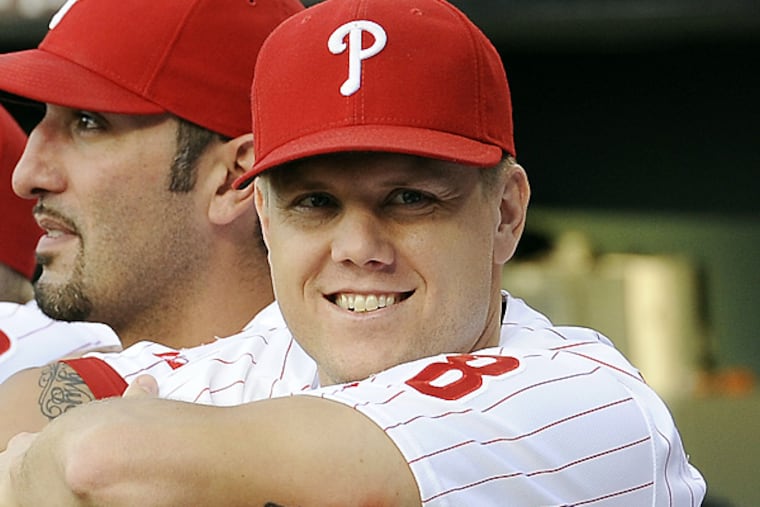Inside the Phillies: Papelbon problem is on Amaro
The reporters will gravitate toward Jonathan Papelbon's locker when pitchers and catchers report to Clearwater, Fla., in less than two months for the start of spring training. He is the surly elephant in the room, the highest-paid closer on a team that cannot afford such a luxury. He is the player the Phillies have attempted to trade for months. He is the one who, last July, called for sweeping organizational changes.

The reporters will gravitate toward Jonathan Papelbon's locker when pitchers and catchers report to Clearwater, Fla., in less than two months for the start of spring training. He is the surly elephant in the room, the highest-paid closer on a team that cannot afford such a luxury. He is the player the Phillies have attempted to trade for months. He is the one who, last July, called for sweeping organizational changes.
Papelbon may say he did not pay attention to the winter talk. He could point to the team's health because spring breeds optimism. He might say nothing at all.
He said enough last summer.
"I would like to stay here," Papelbon told MLB.com. "But if I'm going to have to put up with this, year after year, then no, I don't want to be here. Why would you? Why would anybody?"
Ruben Amaro Jr. will continue to praise Papelbon's presence.
"He's our closer," he will say.
Meanwhile, the general manager will keep searching for a suitor. He will offer to pay another team to correct his mistake just two years after signing a four-year contract with a vesting option for a fifth year. If the losing perpetuates, Papelbon will stew.
Amaro and Papelbon deserve each other. What happens if Papelbon must again confront losing? When will it be a clubhouse issue? How much does Amaro, now cash-strapped, regret splurging for an obsolete commodity?
"It's about spending the money wisely and trying to spend it intelligently," Amaro said Wednesday. "Why would you spend money that you think is going to be money not well spent? That's the important part. With the way the market is set up right now, I'm not real comfortable with going the extra mile with some of the guys that are out there still that may improve us a little bit but in the long run may be detrimental to us."
While discussing the current market for starting pitching, he defined the argument for not signing Papelbon two years too late. The Phillies, a contending team, needed a proven closer, Amaro said when the deal was forged. Papelbon, after all, had thrown the final pitch of a World Series. That carried value, Amaro said.
Jason Motte, Sergio Romo, and Koji Uehara have joined that club in the last three seasons. The fallacy of needing a big-money closer, exposed long ago, is beginning to gain traction among major-league front offices.
If Amaro is fired after this season - and that is an "if" because they play the games and because the Phillies are loyal to their employees (Amaro is under contract through 2015) - he will be remembered for his defiance during this Winter of Indifference.
"Ryan Howard does still live," he said.
"We're built to win," he said.
"Who said we were shopping him?" he said.
That rhetorical question was about Papelbon, and asked as Amaro lounged in the Phillies' ninth-floor suite at the Walt Disney Dolphin Hotel in Orlando during the winter meetings. Downstairs, chatter about Papelbon's availability spread. Amaro playfully chided national baseball reporter Ken Rosenthal, who was not in the room, for peddling such talk. It was more than a rumor.
The Phillies are willing to assume some of Papelbon's remaining $26 million, a figure that could become $39 million if he reaches an attainable vesting option for 2016. The Phillies never pay players to go elsewhere. The last significant instance was the Jim Thome trade in November 2005, when the Phillies were so desperate to clear space for Howard they paid the White Sox $22 million of Thome's $46 million remaining salary.
They have no one to replace Papelbon. They just want to be rid of him.
Any scout who watched Papelbon last season noted his 2.92 ERA was a mirage. One called him a "so-so closer" with "limited" future value. Papelbon's fastball lost life. Recording three outs became a painstaking task. His strikeout numbers plummeted. His luck was sky high. The brutal reports were filed.
But, more than anything, Papelbon embodies an anachronistic way of thinking. Grant Balfour, 62 for 67 in save chances with a 2.56 ERA since 2012, agreed to a two-year, $15 million contract with Baltimore last week - or $11 million less than Papelbon is owed for the next two years - before the Orioles reneged because of medical concerns. Rosenthal used the occasion of Balfour's coming to terms to label the big-money closer a "dinosaur."
It is unfair to render judgment before a pitch is thrown. Remember, Toronto "won" last winter and Miami the winter before that. The Phillies are perceived as a basement dweller in December, and while the evidence is overwhelming, who knows? But should Papelbon become a distraction, Amaro has no one to blame but himself.
Inside the Phillies:
Phillies' Top Five 2014 Salary Obligations
Remaining
Player Position 2014 salary salary after 2014
Ryan Howard 1B $25,000,000 $60,000,000
Cliff Lee LHP $25,000,000 $37,500,000
Cole Hamels LHP $23,500,000 $94,000,000
Chase Utley 2B $15,000,000 $12,000,000
Jonathan Papelbon RHP $13,000,000 $13,000,000
Source: BaseballProspectus.com
@magelb inquirer.com/phillieszone